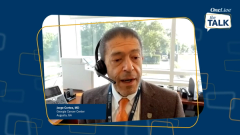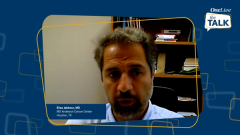
|Videos|July 8, 2021
Phase II Results: Ponatinib + Blinatumomab in Ph+ ALL
Elias Jabbour, MD, highlights early findings from a phase 2 study of the combination of ponatinib and blinatumomab in Philadelphia chromosome-positive (Ph+) acute lymphoblastic leukemia (ALL).
Advertisement
Episodes in this series

Data from the following presentations are discussed:
- Combination of ponatinib and blinatumomab in Philadelphia chromosome-positive acute lymphoblastic leukemia: Early results from a phase II study. (Short, ASCO 2021 Abstract 7001)
- Efficacy: 28 patients (currently 38 at the time of this interview) with either newly diagnosed (ND) or relapsed/refractory (R/R) Philadelphia chromosome-positive (Ph+) acute lymphoblastic leukemia (ALL) were enrolled in the phase II study. 100% of ND patients responded to treatment compared to 88% of R/R patients. A complete molecular response was noted in 86% of enrolled patients (87% in ND vs 86% in R/R patients). A greater treatment benefit was noted in the ND cohort with an estimated 1-year overall survival (OS) and event-free survival rate of 94% and 88%, respectively. This is compared to the 88% and 55% OS and event-free survival rates noted in the R/R patient cohort.
- Safety: Treatment with ponatinib was well tolerated in both patient cohorts with only grade 1-2 side effects noted. Treatment with ponatinib was not discontinued due to toxicity in any patient.
Sponsorship Support From Takeda. Content Independently Developed by OncLive.
Advertisement
Latest CME
Advertisement
Advertisement
Trending on OncLive
1
Single-Center, Retrospective Data Show Low Rate of Lifileucel Infusion Following Referral in Advanced Melanoma
2
Real-World Data Support Clinical Benefit With Lifileucel in Previously Treated Advanced Melanoma
3
Long-Term Cilta-Cel Data Show Low Rates of PFS Events in Standard-Risk R/R Myeloma
4
Dr Riedell on the Long-Term Efficacy of Tisa-Cel in R/R Follicular Lymphoma
5











































